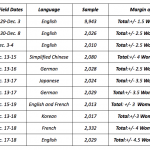S&P Global, with SurveyMonkey, conducted an 11-country survey that examines aspects of financial preparedness, investment behaviors, and impressions of the stock market.
Financial preparedness snapshot around the globe
Women still have ground to make up on men, but Asia represents a bright spot
- Today: Across the globe, women are more likely to find themselves in “fair” or “poor” financial shape compared to men, but Asia represents a bright spot in this dim picture. Korean, Indian, and Chinese women are just as likely to feel prepared as their male counterparts. Switzerland, Australia, France, Germany, and the U.S. have the greatest gender discrepancy, where the share of women in bad financial shape are 10 to 18 points higher than men.
- Tomorrow: A surprisingly large percentage of women in almost all countries surveyed said that if they found themselves without work, they’d only be able to sustain their current standard of living for a short period of time. With the exception of a small portion of women in China (16 percent), between 32 percent (Korean and German women) and 45 percent (French women) of women would have to make some lifestyle adjustments if not for their current income. The greatest shares of women who would be in most dire straits without their income, are in France (45 percent) and the U.K. (43 percent).
- Beyond: By and large, majorities of women feel behind, particularly those living in Korea, Japan, Australia, the U.S. and the U.K. (all over 60 percent). The picture is rosier in India and China, where only about a third feel behind. Greater shares of men are struggling with retirement planning in Korea, Japan, France, and Canada.
Investment decision-making and considerations
Many are skeptical about investing in today’s market, and when making investment decisions, corporate responsibility a greater factor for women
- Corporate Social Responsibility Matters. Consistent with similar findings from the 2018 Edelman Earned Brand Report, making decisions to purchase or not based on a company’s stance on societal issues is becoming the norm for majorities around the world. Far more people care about a company’s stance on social issues than those who don’t when it comes to deciding buy products and also to invest in companies. In general, women are more like than men to put greater weight on corporate responsibility - for instance, while two-thirds (67 percent) of American men care about a company’s position before they buy, a number than rises to 79 percent among American women. The biggest disparity is in Canada where the double-digit margins show 66 percent of Canadian men versus 85 percent of Canadian women see a company’s position on social issues an important factor when investing.
- Uncertainty in Market in Uncertain Times. Many women are skeptical that now is a good time to invest. Across the globe, women show greater reticence than men when trying to make that determination. So, is it advantageous to invest now? With the exception of women in India, majorities ranging from 55 percent in the United States to 83 percent in Japan perceive the stock market with caution or pessimism these days.
- Consider the Source. Trust in information provided by financial institutions in order to make decisions is not the global norm. Similar to trends discussed in the 2018 Edelman Trust Barometer Report, general trust in financial institutions is down, yet eight of the 11 countries in this survey showed majorities have at least some trust in financial institutions with most of India and China adults showing trust.
Methodology
United States and Canada data: This analysis is based on SurveyMonkey online polls conducted among adults ages 18 and older in the United States and Canada. Respondents were selected from the more than 2 million people who take surveys on the SurveyMonkey platform each day. Data have been weighted for age, race, sex, education, and geography using the United States Census Bureau’s American Community Survey and Statistics Canada’s Census Profile to reflect the demographic composition of the age 18 and over within each country.
For all countries outside of the United States and Canada, SurveyMonkey used a third-party panel provider to obtain the sample with quotas for gender, age, and region, where available. The following countries were conducted in-language: France, Germany, Japan, China, Korea, Switzerland. Data have been weighted for age, sex, education, and geography using the country’s respective census data for India, China, Australia, Switzerland, the United Kingdom, and Canada. Data have also been weighted for age, sex, education, and geography using the Pew Global Attitudes Survey for Germany, Korea, and Japan. Data have been weighted for age, sex, and geography using census data and education using the Pew Global Attitudes Survey for France. Side by side toplines for each country are available here. Additional details by country are noted in the table below:




